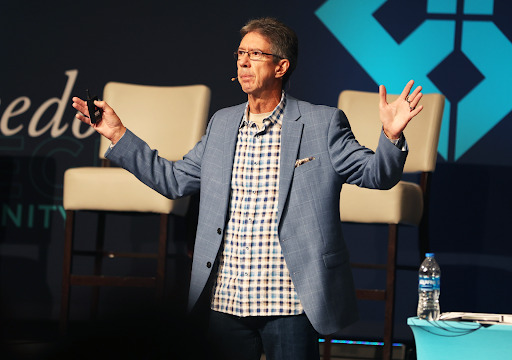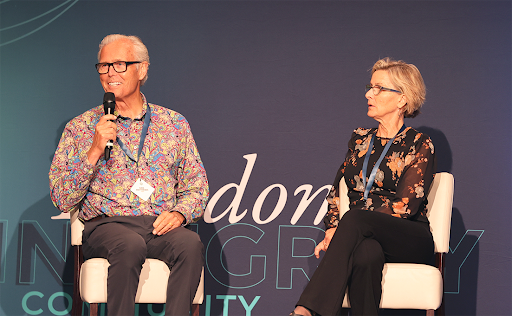
by Dr David Phelps
We recently hosted a Freedom Founders Member Event in San Antonio, Texas (our 41st!). The theme of our gathering: Full Cycle Investing. We discussed the current market, the changing strategies in real estate investing, and lessons learned from the past that can guide us in the present.
Below are a few key takeaways that may help you out today with your financial stewardship.
#1 Economic Headwinds and Preparing for a Recession

“I’m going to give you the facts. You can make up your own mind as to what you think of them.” – Ted Oakley, Oxbow Advisors
The following are key facts and takeaways from Ted Oakley’s presentation and my conversation with him regarding the economy and what we can do as investors to preserve our capital.
US Private Construction spending skyrocketed since 2020. Real estate is crowded. Many operators don’t know what they’re doing and are operating based on what’s worked in the past. They are in for a rude awakening.
Home Prices vs Hourly Earnings. There is a widening gap between these two metrics that is unsustainable. The gap will close, either by a reduction in home prices or an increase in hourly earnings. Right now home prices are due for a correction.
Utility shut-offs hit record highs. This is a metric that few people track. However, it gives important insight into the state of the economy and the US consumer.
The credit card delinquency rate just hit a new high. US consumer savings are being depleted, and inflation is still a problem. Consumers are finding it harder and harder to pay their bills.
Data points indicating volatility:
- 2023 is the biggest year for bankruptcies since 2010.
- Luxury goods consumption is trending lower
- Child Care Funding = American Rescue Plan ends Sept 2023
- The FFCRA Medicare Program ended in March 2023. 8-10 million people are no longer enrolled.
- Economic Injury Disaster Loans are now coming due.
- SNAP program (food stamps) reduced.
- Student loan payments resume in the 3rd quarter.
- The UAW strike is still ongoing.
- A looming government shutdown.
Key Notes on the Financial Industry:
- The gap widening between the S&P 500 and 30-year Treasury earnings is an indicator of recession. The gap is currently as wide as it was back in 2008 and 1987. Stocks are currently overvalued.
- Volatility can create the impression of growth without any real gains. Historically there have been long periods of time in the stock market with minimal returns. For example: The S&P returns from 1999 to 2012 were approximately 1%.
- 44% of financial professionals entered the industry post-2008. Few have seen what a full cycle looks like!
Avoid buying equities until well past the “bottom” of the recession. There is plenty of time to ride the markets back up. Don’t worry about missing out. The greater risk is buying back in too early! Markets can and will go down further than you expect. Bonds can be a much stronger play during a correction or down cycle.
Base capital vs investment capital: It is important to have some “no touch money” that is liquid, short-term, and not exposed to market risks (treasuries, CDs, or similar). No matter what you invest in, there will be rocky times. To get through rocky times, emotionally, requires a strong foundation of base capital. It tells you “I’m going to be okay” even when experiencing volatility. If everything you have is exposed to market volatility, it will be difficult to stay steady.
Wisdom for the Next Generation: Most people wish the best for their children, but few are willing to pay the price. Foster self-confidence and self-reliance. Create a strong connection between action and consequence. Having a job early in life imparts the value of hard work. The greatest gift you can give a child is to know that they are loved, but that they are their own person. They need to build the confidence to stand on their own two feet.
#2 Turbulence in the Credit Markets

The following are key insights from my discussion with Chris Litzler.
What is going on in the credit markets? For the first time in decades, there is a way to make a yield without taking risks (Treasuries/bonds). What does this mean? In order to entice capital into other investments, there needs to be a spread that is worth the risk.
Banks are tightening. Many banks are increasing their cash reserves, hedging against the possibility of large spikes in withdrawals. There is plenty of capital available from other forms of institutional capital (government entities, life insurance companies, etc), but the cost of that money has increased. As a result, the only people who are borrowing are those who need to.
The Coming Wave of Short-Term Financing. Many recent investment acquisitions were constructed using short-term or variable-rate financing. As these loans come to maturity there will be significant financial pressure. Operators will be forced to refinance at a much higher rate.
Low Trade Volume Propping up Values. Economic uncertainty and higher interest rates have decreased deal volume significantly. Trades determine value. Once operators are forced to start selling assets at discounted prices, it will affect asset valuations across the board.
Fixed vs Variable Rate Financing. For projects that have strong cash flow and fixed-rate financing, there is still a strong outlook. Projects with exposure to short-term or variable-rate financing will face headwinds.
Capital Calls are a new reality. This is especially true for some of the operators who entered late in the game with not as deep of pockets. This is a very common symptom of the late stages of a bull run market.
Sustained Demand for Real Estate: Few construction starts are happening, signifying a supply issue in the coming years. Real estate still has strong fundamentals as an investment. The issues we are facing right now are issues in the credit markets.
Loan Covenants – A Hidden Threat: Some bank financing comes with specific provisions called loan covenants. These terms require certain criteria to stay in compliance with the loan. These can include certain net worth, liquidity, or debt service ratios that must be maintained. Banks can demand to see your balance sheet to ensure compliance with the terms of the covenants. Failure to maintain can place the loan in default or trigger paydown provisions. Covenant compliance will likely see increased scrutiny as breaches of loan covenants give banks the ability to demand repayment. A critical part of your due diligence as an investor is to understand the financing terms used by operators on investment projects.
How quickly can the Fed turn a falling market around? If the market solely has an interest rate problem, the Fed can affect it fairly quickly. However, if there are more fundamental economic challenges, it takes time to affect. If a property is performing well and simply needs lower interest rates to refinance, lower rates solve the problem. However, if the property faces lower occupancy or stagnating rents via economic distress (job loss, inflation, etc), these issues take longer to solve. Lower interest rates don’t solve underlying economic problems.
#3 “Back to the Future” Lessons from 2008

Here are my lessons learned from 2008 and how they are relevant today.
The “Hunnicutt” Case Study – Using Creative Financing to Solve Problems. I purchased a house for a 47% discount in 2008 using creative terms with seller financing. The case study illustrated how understanding net present value is the key to structuring creative financing terms. It also showed the value you can create by developing the skill sets to “rehab financing” and utilize key relationships for other aspects of the deal.
“Nobody else could buy the house because they couldn’t put together a cash offer that made sense. I paid her what she was asking… but I did it my way.”
Creative financing will be the key to success in the next phase of the economic cycle. I collaborated with a local operator to acquire 18-20 deals in the years after 2008 using a mix of cash offers, seller financing, and loan assumptions. Collaborating with a local expert can help you avoid direct involvement in rehabs, instead bringing value to the table as the capital partner. Negotiating specific deal terms is essential to investing without direct ownership of the property. This can reduce your downside risk while still benefiting from the equity growth in the property.
Anatomy of a deal. There are 4 roles in all real estate deals as shown below. By collaborating with others, you can strategically position yourself in the most profitable role with the least amount of time required.
- Finding the deal
- Structuring and negotiating the deal
- Funding the deal
- Operating the deal
How to acquire properties without using banks. In 2008 I built a portfolio without relying on bank financing. Loan assumptions and “subject to” financing made it possible for me to acquire properties at a discount at a time when buyers were few. I was also avoiding the regulation and complexity of “syndicating” deals by going face-to-face and creating these deals myself.
#4 Asset Allocations in a Shifting Market

Three veteran Freedom Founders Members and leaders in our community shared real data on their portfolio allocations when joining Freedom Founders, and how those allocations have shifted throughout their journey, leading up to their current allocations today.
No “one size fits all”. The presentations highlighted the fact that each member took a different approach and a unique path to their goals. There was not one singular blueprint, but rather each individual charted their own course, 3 of which are now Free For Life.
Freedom can be a spectrum. Freedom is not an “all or nothing” proposition. Progress can be achieved on a spectrum. Reaching 50% of your Burn Rate with passive income can unlock choices and options in your life even before you achieve “Free For Life”. It is important to clarify some mile markers on the road to ensure a sense of progress.
Better more efficient returns. Some investments acquired prior to Freedom Founders were evaluated against the opportunity for better more efficient returns. Developing financial acumen allows for less dependence on “luck” or market tailwinds for success.
Take what the markets are giving. Investment strategies vary depending on the conditions of the market. Some members who joined years ago initially invested heavily into turnkey rental properties. Today they are harvesting equity off the table and shifting to other investments. It is critical to understand the opportunities in every segment of the market cycle.
Cash flow is key to behavior change. Even for investors who are still earning active income, investing for cash flow can create an important psychological shift creating more permission to make behavioral changes (less time at the practice, etc). Seeing cash flow hit your bank account regularly is more tangible and creates more peace of mind.
Allocation and Diversification. Younger practitioners still in active practice may have more flexibility to allocate greater percentages of their portfolio to the opportunities that the markets are providing at any given moment. Practitioners out of active practice may benefit from a greater focus on diversification to ensure the preservation of principal.
This was just a snapshot of the expertise at one of our events and only highlighted a data-focused topic of the economy.
There are many more takeaways present, in real-time, when we meet that impact the personal, professional, and legacy of one’s life.
To your freedom!
– David
P.S. Whenever you’re ready, here are some other ways I can help fast track you to your Freedom goal (you’re closer than you think) :
1. Schedule a Call with My Team:
If you’d like to replace your active practice income with passive investment income within 2-3 years, and you have at least $1M in available capital (can include residential/practice equity or practice sale), then schedule a call with my team. If it looks like there is a mutual fit, you’ll have the opportunity to attend one of our upcoming member events as a guest. www.freedomfounders.com/schedule
2. Become a Full-Cycle Investor:
There are many self-proclaimed genius investors today who think everything they touch turns to gold. But they’re about to learn the hard way what others have gained through “expensive” experience. I’m offering a free report on how to become a full-cycle investor, who knows how to preserve and grow capital in Up and Down markets. Will you be prepared when the inevitable recession hits? Get your free report here.
3. Get Your Free Retirement Scorecard:
Benchmark your retirement and wealth-building against hundreds of other practice professionals, and get personalized feedback on your biggest opportunities and leverage points. Click here to take the 3 minute assessment and get your scorecard.

